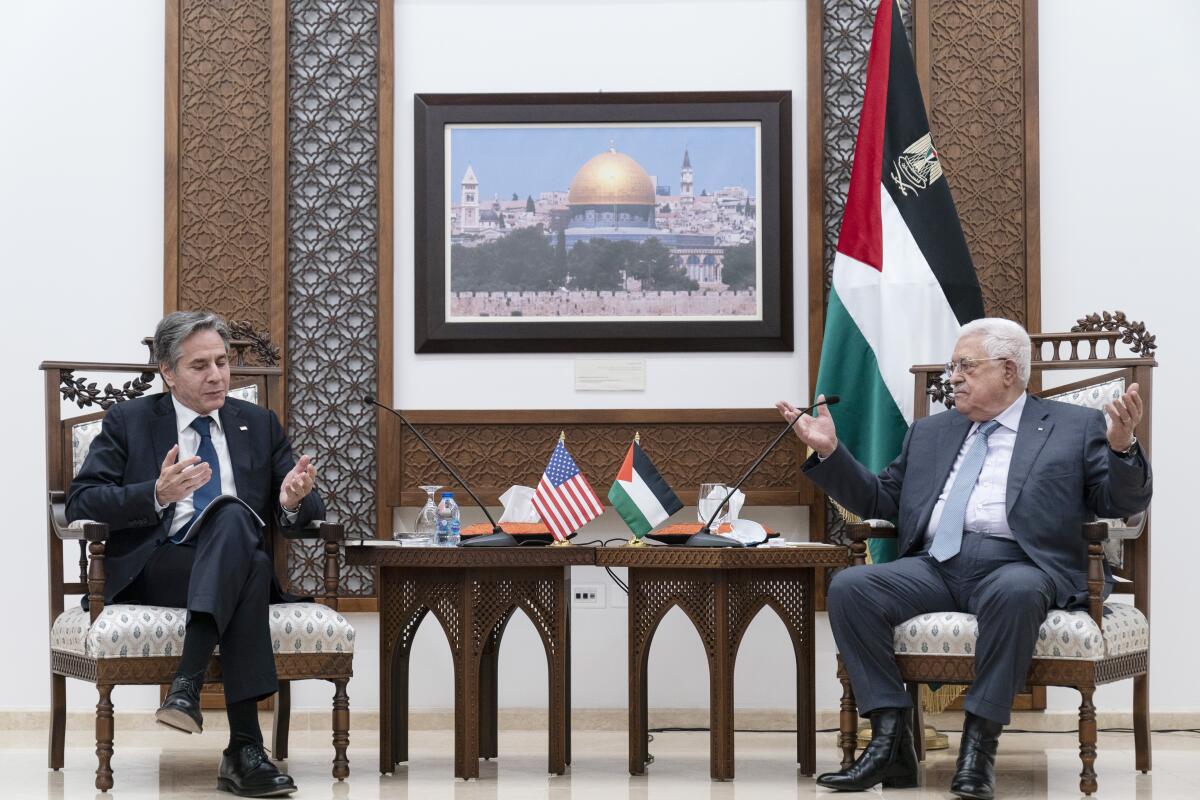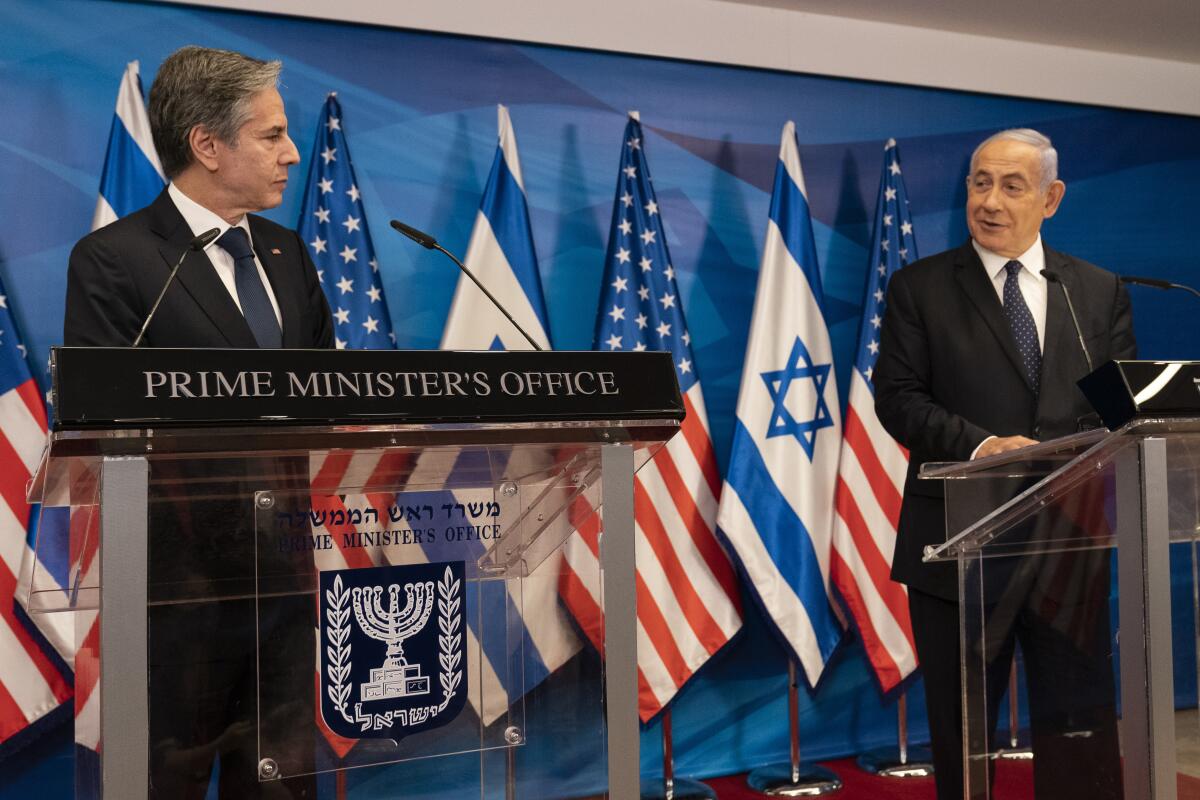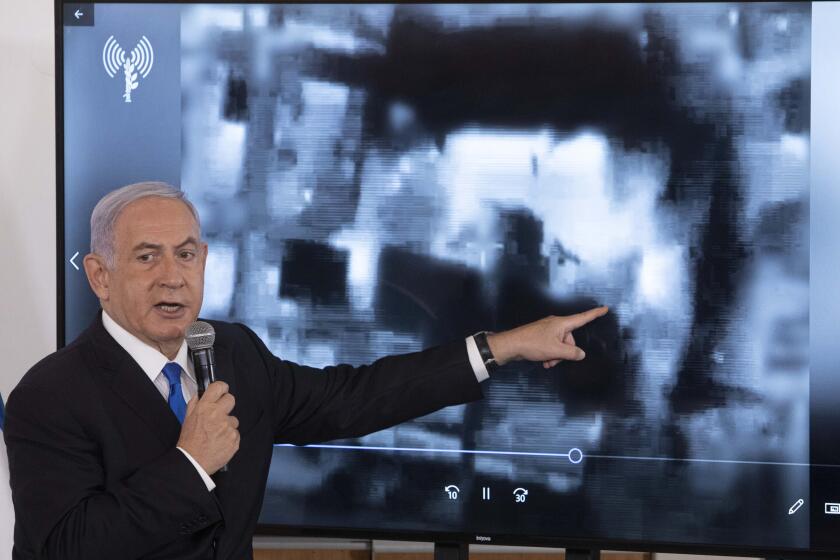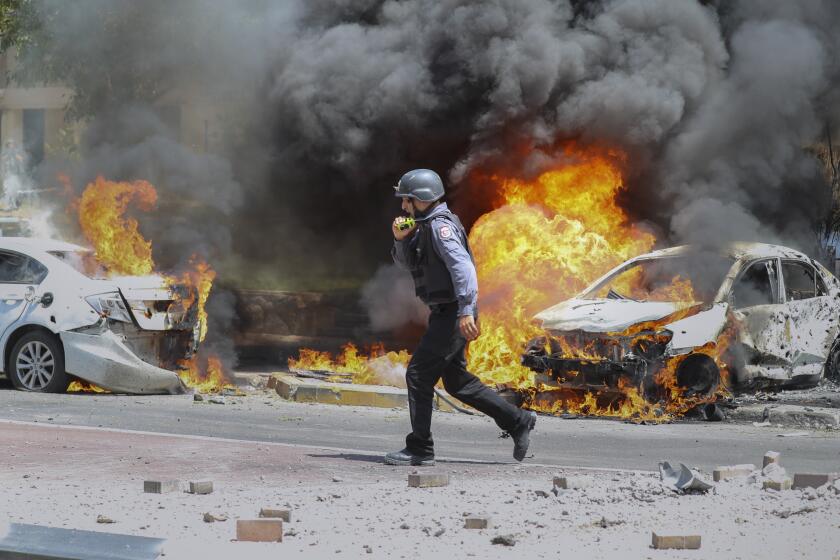Blinken in West Bank offers aid and a renewed push for a Palestinian state

RAMALLAH, West Bank — Secretary of State Antony J. Blinken on Tuesday became the most senior U.S. official to travel to the heart of the occupied Palestinian West Bank in years, offering millions in aid and a renewed push for a future Palestinian state.
And when a secretary of State comes to town — especially one that has found itself caught on the fringes of deadly warfare in recent days — people sit up and take notice. Blinken arrived here in Ramallah in a mile-long convoy of armored vans that, lights ablaze and with police escort, bobbed its way over the hillside streets of the sprawling city to the compound of Palestinian Authority President Mahmoud Abbas.
Blinken, on the first day of his first Middle East trip, also announced plans to reopen a U.S. diplomatic mission in Jerusalem that will handle Palestinian affairs. The previous American Consulate in Jerusalem, a de facto U.S. Embassy for Palestinians, was shut down in 2019 by then-President Trump when he recognized Jerusalem as the capital of Israel and moved the U.S. Embassy there from Tel Aviv.
That was a major affront to Palestinians — and a reversal of decades of U.S. and international policy — because Palestinians want East Jerusalem as the capital of their future sovereign state, and because agreements for decades had established that the issue would be resolved as part of a final comprehensive peace pact.
It was also part of Trump’s efforts to punish and marginalize the Palestinians. Blinken’s announcement, while still a first step, signals an upgrade in U.S.-Palestinian ties destroyed under Trump. Speaking later to reporters, Blinken did not offer any news on the Palestinians’ de facto embassy in Washington, which Trump also ordered closed.
Reopening the consulate in Jerusalem is “an important way for our country to engage with and provide support to the Palestinian people,” Blinken said.
He also announced new infusions of aid for the Palestinians totaling $112.5 million, including emergency disaster relief after the 11-day war between Israel and the militant group Hamas, which devastated the Gaza Strip. Others are also stepping in: On Friday, the United Nations announced a $22.5-million aid package for Gaza, and Egypt — which along with Israel maintains a blockade on the strip — sent 130 trucks loaded with 2,500 tons of food and medical aid. Tunis, Morocco, Kuwait and others followed suit, and Israel opened a border crossing into Gaza and allowed it to slightly expand fishing in the Mediterranean.
After receiving praise for helping to broker a cease-fire between Israel and Hamas, the Biden administration is looking to build toward the next phase: a deeper and more complex resolution to decades of conflict.
But Blinken’s more immediate goal at the start of his three-nation, 48-hour mission was making sure the cease-fire holds and humanitarian aid can be delivered to Gaza.
Even with such deliberately lowered expectations, the Americans were hamstrung. Blinken did not speak to the Palestinians affiliated with Hamas, based in the Gaza Strip, but rather the leaders of the Fatah movement and Palestinian Authority who govern the occupied West Bank. The U.S. regards Hamas as a terrorist organization, which means that Washington cannot negotiate with the group.
In fact, his dramatic sweep into Ramallah, armed with money and the offer of a consulate, was meant in large part to boost Abbas, who is 85 and declining in health and popularity.
Abbas listed the long-held grievances Palestinians have with Israel and the occupation but expressed gratitude for the Biden administration’s fresh interest.
“This is something that we highly value and we hope that the future will be rife with diplomatic and political efforts,” Abbas said, adding that the “actions of a handful” should not be allowed to destroy peace.

Meanwhile, the Biden administration’s influence with Israel is also being tested after four years of the unabashedly pro-Israel government of Trump.
In their first public comments together earlier Tuesday in Jerusalem, Israeli Prime Minister Benjamin Netanyahu pointedly warned Blinken against returning to the Iran nuclear deal, asserting that it “paves the way” for a “regime committed to our destruction” to build a nuclear arsenal “with international legitimacy.”
But a beaming Netanyahu was full of praise for Biden and Blinken’s support for Israel and its “right to self-defense,” including new money to replenish its vaunted Iron Dome air-defense system, which is credited with knocking out the majority of rockets Hamas fired at Israeli cities.
The Biden administration’s support for Israel has been steady, but both the president and Blinken have made a point of recognizing Palestinian casualties and advocating for security and democracy for Palestinians “in equal measure” to that of Israelis.
For Israel’s prime minister, Gaza conflict brought political benefits — at least for now.
Building on the cease-fire, Blinken said, “starts with the recognition that losses on both sides were profound.”
He added: “As the Talmud teaches, to lose a life is to lose the whole world, whether that life is Palestinian or Israeli.”
Administration officials acknowledge the difficult nature of the task and say they hope the U.N. can serve as an intermediary to channel reconstruction aid into crushed Gaza neighborhoods and eventually bring about a rapprochement between Hamas and the Palestinian Authority. While the authority governs the West Bank, it has fallen out of favor with many Palestinians who’ve seen little respite from Israel’s occupation. Hamas and the Palestinian Authority revile each other.
The tricky part for Blinken is how to help the people of Gaza and bolster the Palestinian Authority and other moderate Palestinians while avoiding any strengthening of Hamas.
“We know that to prevent a return to violence, we have to use the space created to address a larger set of underlying issues and challenges,” Blinken said. “And that begins with tackling the grave humanitarian situation in Gaza and starting to rebuild.... I will work with our partners closely, with all to ensure that Hamas does not benefit.”
Separately, a senior State Department official briefing reporters ahead of Blinken’s trip said the U.N., which maintains a strong presence in Gaza through its operation of schools, hospitals and other services, “will get us on the pathway” to a “reintegration” of the Palestinian Authority in Gaza. “We hope [that process] in turn can help create the conditions to move us forward to a more stable situation,” the official said.
Undergirding the U.S. plan, the official acknowledged, is a reduction of the influence of Hamas, an organization that many Palestinians may not like but regard as the one force able to stand up — however disastrously — to Israel. Administration officials want to make the case that Hamas has only led its people to more misery and despair, and then feeds on that despair.
In their latest war with Israel, Hamas militants have lobbed more than 4,000 projectiles, reaching deeper into Israeli territory than ever before.
The Israel-Hamas fighting — the deadliest eruption of violence between the two adversaries in seven years — is Biden’s first major foreign-policy test and one that both he and Blinken had hoped to avoid, preferring to focus on China and other pressing crises rather than the intractable Middle East conflict. Blinken has made it clear, even before this round of warfare, that the time is not right to attempt to rekindle negotiations that would lead to the creation of a Palestinian state next to Israel, the so-called two-state solution.
But the deadly fighting also appeared to make clear that putting the Palestinian issue on the back burner, as Trump did and Biden hoped to continue, is not tenable.
Blinken travels Wednesday to Cairo and Amman, Jordan, for talks with Egyptian President Abdel Fattah Sisi and Jordan’s King Abdullah II, respectively.
Times staff writer Nabih Bulos in Jerusalem contributed to this report.
More to Read
Get the L.A. Times Politics newsletter
Deeply reported insights into legislation, politics and policy from Sacramento, Washington and beyond. In your inbox three times per week.
You may occasionally receive promotional content from the Los Angeles Times.













